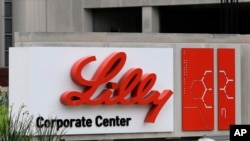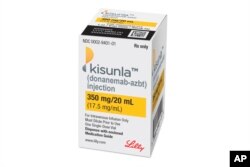U.S. officials have approved another Alzheimer's drug that can modestly slow the disease, providing a new option for patients in the early stages of the incurable, memory-destroying ailment.
The Food and Drug Administration approved Eli Lilly's Kisunla on Tuesday for mild or early cases of dementia caused by Alzheimer's. It's only the second drug that's been convincingly shown to delay cognitive decline in patients, following last year's approval of a similar drug from Japanese drugmaker Eisai.
The delay seen with both drugs amounts to a matter of months — about seven months, in the case of Lilly's drug. Patients and their families will have to weigh that benefit against the downsides, including regular IV infusions and potentially dangerous side effects like brain swelling.
Physicians who treat Alzheimer's say the approval is an important step after decades of failed experimental treatments.
"I'm thrilled to have different options to help my patients," said Dr. Suzanne Schindler, a neurologist at Washington University in St. Louis. "It's been difficult as a dementia specialist — I diagnose my patients with Alzheimer's and then every year I see them get worse and they progress until they die."
Both Kisunla and the Japanese drug, Leqembi, are laboratory-made antibodies, administered by IV, that target one contributor to Alzheimer's: sticky amyloid plaque buildup in the brain. Questions remain about which patients should get the drugs and how long they might benefit.
The new drug's approval was expected after an outside panel of FDA advisers unanimously voted in favor of its benefits at a public meeting last month. That endorsement came despite several questions from FDA reviewers about how Lilly studied the drug, including allowing patients to discontinue treatment after their plaque reached very low levels.
Costs will vary by patient, based on how long they take the drug, Lilly said. The company also said a year's worth of therapy would cost $32,000 — more than the $26,500 price of a year's worth of Leqembi.
The FDA's prescribing information tells doctors they can consider stopping the drug after confirming via brain scans that patients have minimal plaque.
More than 6 million Americans have Alzheimer's. Only those with early or mild disease will be eligible for the new drug, and an even smaller subset are likely to undergo the multistep process needed to get a prescription.
The FDA approved Kisunla, known chemically as donanemab, based on results from an 18-month study in which patients given the treatment declined about 22% more slowly in terms of memory and cognitive ability than those who received a dummy infusion.
The main safety issue was brain swelling and bleeding, a problem common to all plaque-targeting drugs. The rates reported in Lilly's study, including 20% of patients with microbleeds, were slightly higher than those reported with competitor Leqembi. However, the two drugs were tested in slightly different types of patients, which experts say makes it difficult to compare the drugs' safety.
Kisunla is infused once a month compared to Leqembi's twice-a-month regimen, which could make things easier for caregivers who bring their loved ones to a hospital or clinic for treatment.











